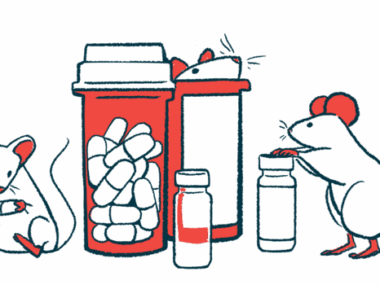Adapting With the Hope That a Tradition Can Be Toppled
Written by |

“Put me in, coach, I’m ready to play today,
Look at me, I can be center field.”
John Fogerty’s homage to an aspiring baseball player is reminiscent of my pre-ALS relationship with nearly any game of skill. It was the rare sport that, once exposed to it, I didn’t have a hankering to understand and, if possible, participate in. Typically judging myself equal to the task, irrespective of field of competition or position, I was ready to play.
That proclivity began at an early age. Living in a neighborhood teeming with kids, sandlot “anything” was a likely happening during any daylight, non-school-day hour. Minimally, having a brother close in age meant any sporting event could be simulated.
My parents capitalized on my obvious zeal. My mom bought me books about my growing list of sports heroes. My dad engaged me in sports trivia. When I wasn’t playing it, I was reading about it, or memorizing it. Of secondary benefit was that I became an avid reader, and my cognitive skills improved.
The passion followed me onward. In junior high and high school, I was a varsity participant. In college, I spent many non-study hours at the gym and played intramural basketball, softball, and football.
Upon commencing my professional career, I joined local leagues in all three sports. I also made time for golf and bowling leagues. I occasionally dabbled in racquetball, tennis, and cross-country skiing.
As time marched on, circumstances and priorities prompted a whittling back of the sports I remained active in. Two were to remain sacred cows. I intended on playing basketball and golf deep into my senior years. I believe it was an achievable goal, had not ALS viciously robbed me of the opportunity to chase it.
That blow crippled my psyche before laying major claim on my body. Post-diagnosis, while physically capable of limited participation, emotionally I could not bring myself to set foot on either a basketball court or golf course. In fact, for several months it was too painful to even watch a sporting event on television. I had spent an inordinate amount of my life gripping a ball, bat, or club, only to discover it was the other way around.
My reaction wasn’t unique. As my network of fellow ALS sufferers grew, a few anecdotally shared how the awareness of their imminent decline altered their engagement with precious hobbies. Enthusiasts of painting, pottery, auto restoration, sailing, gardening, woodworking, and needlepoint offered how the intrusion of ALS changed their pursuit of each.
It turns out that sometimes it is predicted phenomenon. Situational depression is a type of adjustment disorder. It can make it hard for you to adjust to your everyday life following a traumatic event, such as illness. Symptoms include loss of interest in things previously enjoyed. One common sense, catchall countermeasure is adaptation. ALS certainly forces adaptation. A fitting hashtag could be #adaptorgiveup.
Embedded in my love affair with sports was fondness for competing. I adapted to the absence of external competition by turning those juices inward. I embraced legendary coach John Wooden’s reverence for doing “your best to become the best you are capable of becoming.” I began challenging myself to optimize my ever-diminishing capabilities.
To a lesser extent, I became a competitor of ALS. Again, I borrowed from Wooden: “Do not let what you cannot do interfere with what you can do.” In a war of attrition, I strive to maintain the “cans” while slowing the accumulation of the “cannots.”
Toward both ends, I have employed some alternative tactics. A few included visualizing myself completely healed, reveling in something fully satisfying. Curiously, it was not running, jumping, or striking a golf ball that I’d envision. Instead — no doubt the consequence of receiving nurturing care for so long — I’d picture myself in service of others.
I’ve also adjusted my sporting event watching habits. I take in far fewer telecasts, and rarely start to finish. When I do watch, my focus is not so much on the outcome of the contest or any given play. Rather, it is the athlete’s attempt to harness the potential of God’s creative genius that gets my attention.
Last weekend, I caught some of the live broadcast of the Masters golf tournament. Annually, it is hyped as a “tradition unlike any other.” This year, due to COVID-19, it violated two traditional elements by being held in November, and without patrons.
In that spirit, the default tradition of no one surviving ALS needs to be broken. If I were fortunate enough to be part of that tradition-trampling, my visualizations would transform into reality. Walking and talking, fully valid and enabled, I’d sing loud and joyously in Fogerty fashion:
“Put me in, Lord, I’ve come to pray today.
Thankfully, it’s me, your volunteer.”
***
Note: ALS News Today is strictly a news and information website about the disease. It does not provide medical advice, diagnosis, or treatment. This content is not intended to be a substitute for professional medical advice, diagnosis, or treatment. Always seek the advice of your physician or other qualified health provider with any questions you may have regarding a medical condition. Never disregard professional medical advice or delay in seeking it because of something you have read on this website. The opinions expressed in this column are not those of ALS News Today or its parent company, Bionews, and are intended to spark discussion about issues pertaining to ALS.






Frankie Reed
Your statement was inspiring though I am not fully prepared in mind the outcome of my situation I've found myself in my I was diagnosed 2-13-2019 in my doctors few words my life forever changed it was a blow to my mind that I am not truly at peace with I've tried taking my life a few times and failed only because I was found my someone who called an ambulance that got me to a hospital in time to bring me back from the dead the thoughts of taking my life is without doubt on my mind but after I started communicating with others with ALS my thoughts has changed in some ways but none the less are still with me your story really hit a nerve none of this is my fault but I own it now and I'm no longer blaming myself as much lost my upper body just a few fingers are still working just the thought of losing my arm's and hands leaves me with understandably horrified thanks for your story
Rick Jobus
I certainly relate to your bouts with despair. Please reach out whenever you need a friend. In the meantime, I am praying for you.
Dave Reckonin
What do you ask for in your prayers, Rick ?
Rick Jobus
Among other things, I ask for you comfort and salvation,Dave.
Dave Reckonin
Nice try at the dodge Rick, but you knew full well that I was asking you what you were praying for for Frankie.
What are you praying for when you pray for Frankie?
Rick Jobus
I pray for similar blessings for Frankie.
Jonathan Maddock
Thank you for sharing. That is a wonderful way to ask God to enable you to help others, and it is then a purpose driven life.
We all need more of that.
Dave Reckonin
I don't think we should ask anything of the creator of ALS.
Elke
Hello Rick, Hello Dave
Dear Rick I often read your columns and I admire how well you write.
I am an atheist and I have difficulties in believing in anything.
I don't think anything created ALS or any illness at all. I am suffering from anorexia nervosa since puberty I'm 41 now, but I don't believe that I*ve been punished for not believing in anything. I might have believed a little when I was younger, but because, if I may say it like this, I was forced to believe, or else I burn in hell. I needed years to free myself from this belief. I prefer a clear mind. I know that after I'm dying I'm neither going to hell nor to heaven. Death is the definite end and I have my peace with that belief.
Rick Jobus
Elke,
Thank you for the comments. I've had my own challenges, faith-wise:
I am ashamed to say,
that there became a day,
when I turned my back on God,
with a wink and a nod.
My parents early passing,
sent my doubts amassing.
Not seeing forests or the trees,
my faith severed at the knees.
Hunkering low into a shell.
a crippling spiritual hell.
Thankless for gifts richly planted,
taking everything for granted.
Moved not by life's magic,
or conversely its' tragic.
No peace would l know,
like a sad hobo.
Two decades this spanned,
I was Paul Simon's "island".
Then I became weak and sick,
and the devil tried a trick.
But Jesus's constant urging,
led to a different merging.
In my bluest moment He was there,
as He is now here, yet everywhere.
Now fully back on board,
hand-in-hand with the lord.
Despite countless sins and harms,
God welcomes with open arms.
I found a blessing in turning ill,
it's not a completely bitter pill.
Though I'd opt for some other plan,
I have emerged a better man.
Celebrating all of life's rich beauty,
worshiping God a treat, not duty.
With my loudest inner voice,
I thank the Lord and rejoice.
This is my testimony,
God's sacred grace rescued me.
elke
as usual beautifully written.
I think I understand. For you God is comforting like my Teddybaer is comforting for me. I may exaggerate when saying that I couldn't survive a day without him, especially when those few people people I have contact with are not available when I need them the most, he is always there
Katie
I'm only 3 months into ALS diagnosis--and finding this ALS Forums via ALS News Today was a 'God-send' --the very 1st pieces of POSITIVE outlook pieces!! I WAS having a crisis of faith for sure--now things are slowly making more sense...in terms of Thank you Rick J (yes, NICE writing style!), and other pALS in this network!
Yes, Elke, and Dave R...I can relate in some ways to your side of things...my older sister has been anorexic since age 15 (now 65), and I have a brother who who seriously thinks God 'punishes' and makes bad things happen...and it has turned him inside out in thinking and living for 35+ years! And, I have younger sibs already gone; 2 other sibs with their own anger/control issues...so guess what? I'm not 'connected' with 'family'--except to pray for 'understanding & and patience to carry on and recognize the plan is in God's time & hands' (not mine to orchestrate...which I did try for MANY years of heartache).
In the realm of science, I think terrible, awful, horrible bad genetics, bad environment, bad luck (I don't swear) are the trifecta of ALS...in my short time trying to come to some understanding of this disabiling disease...